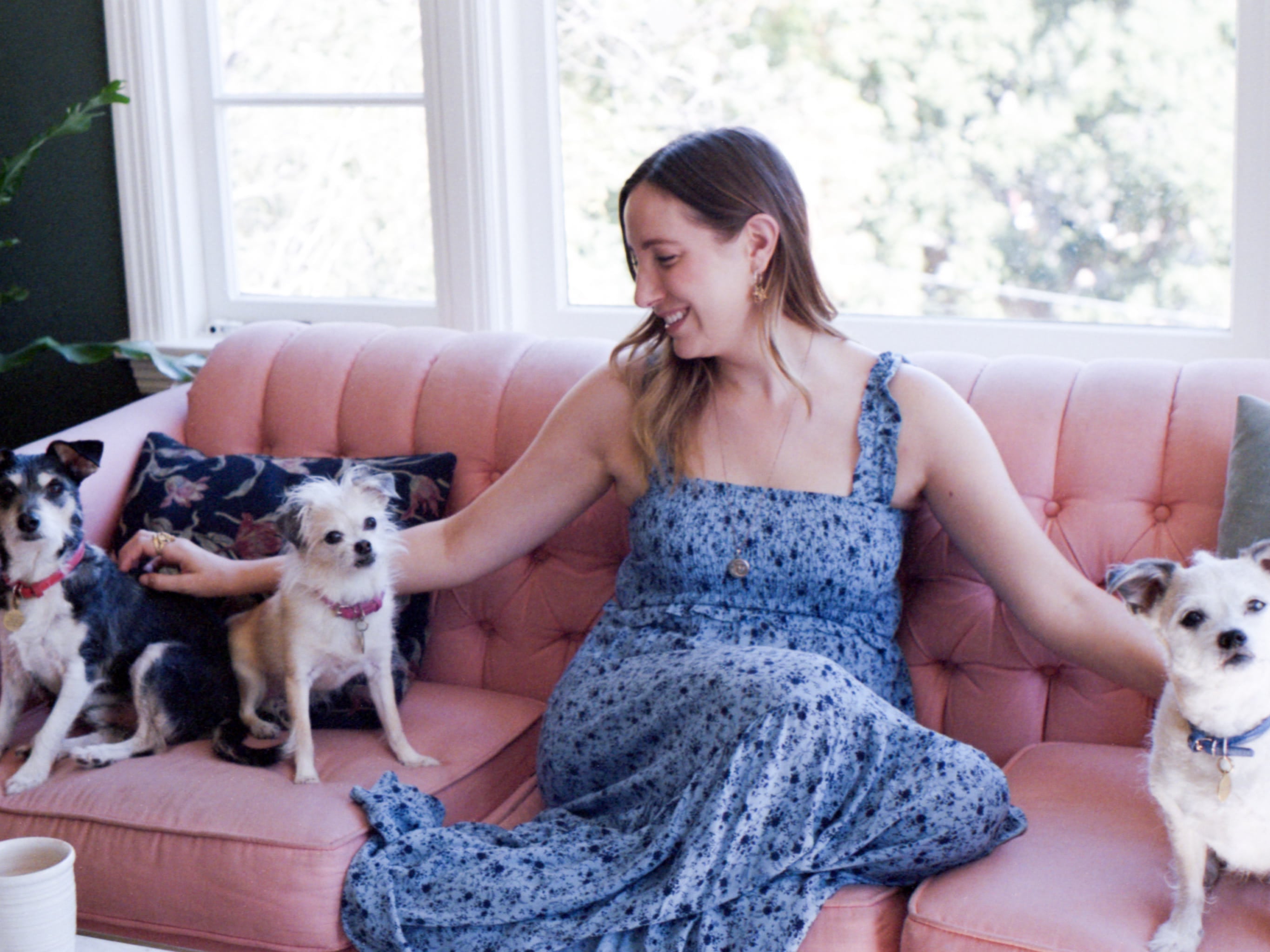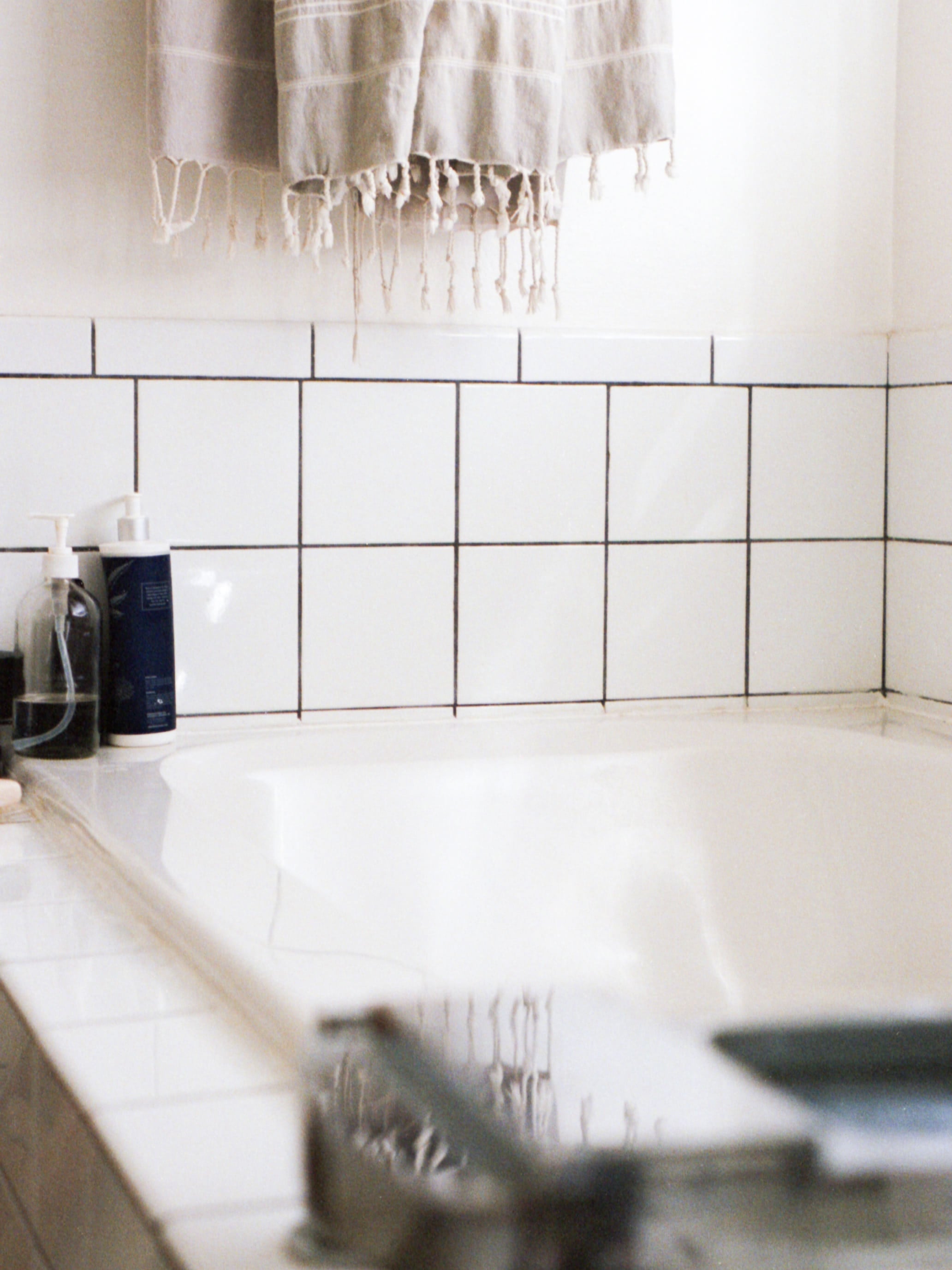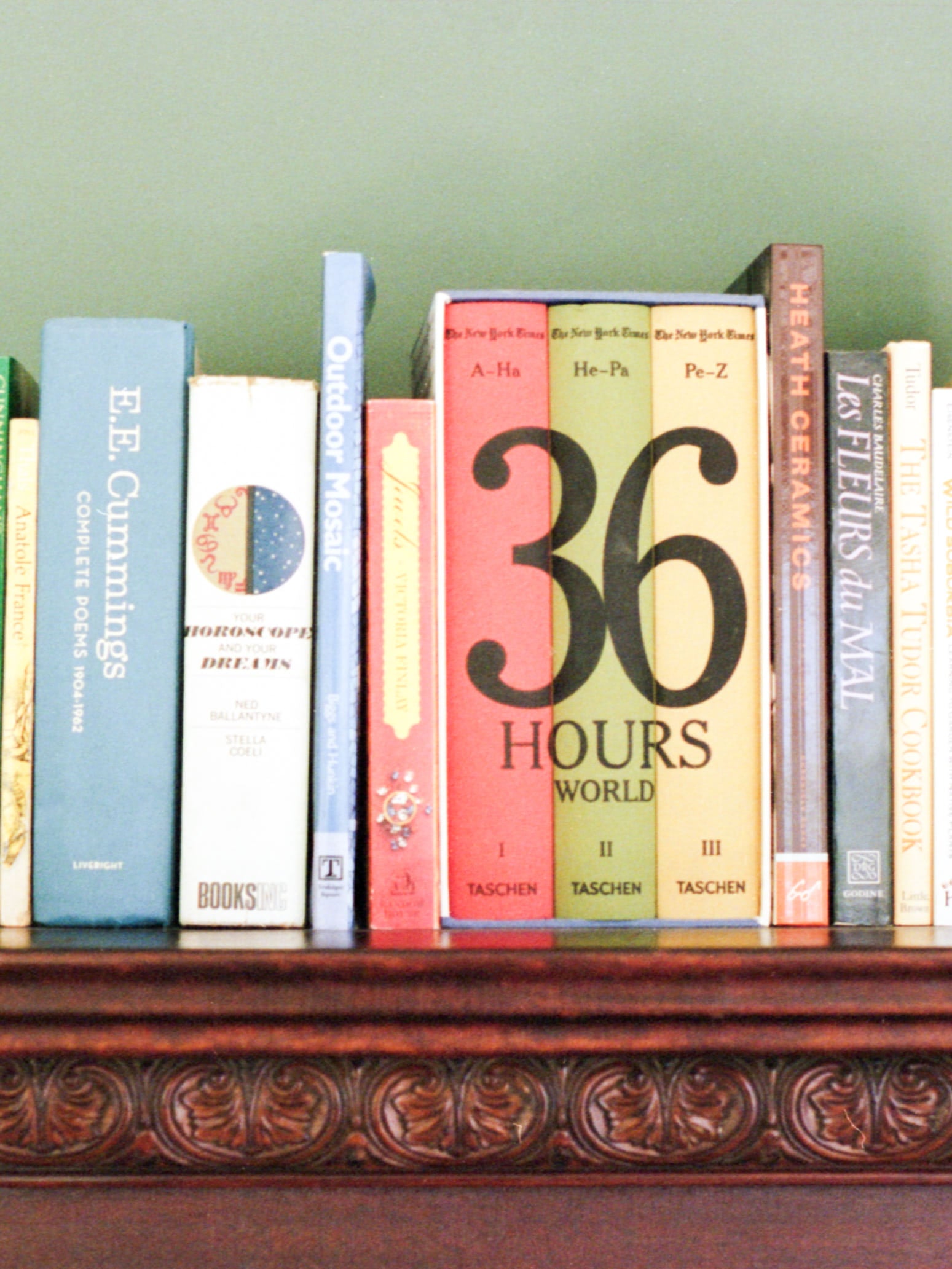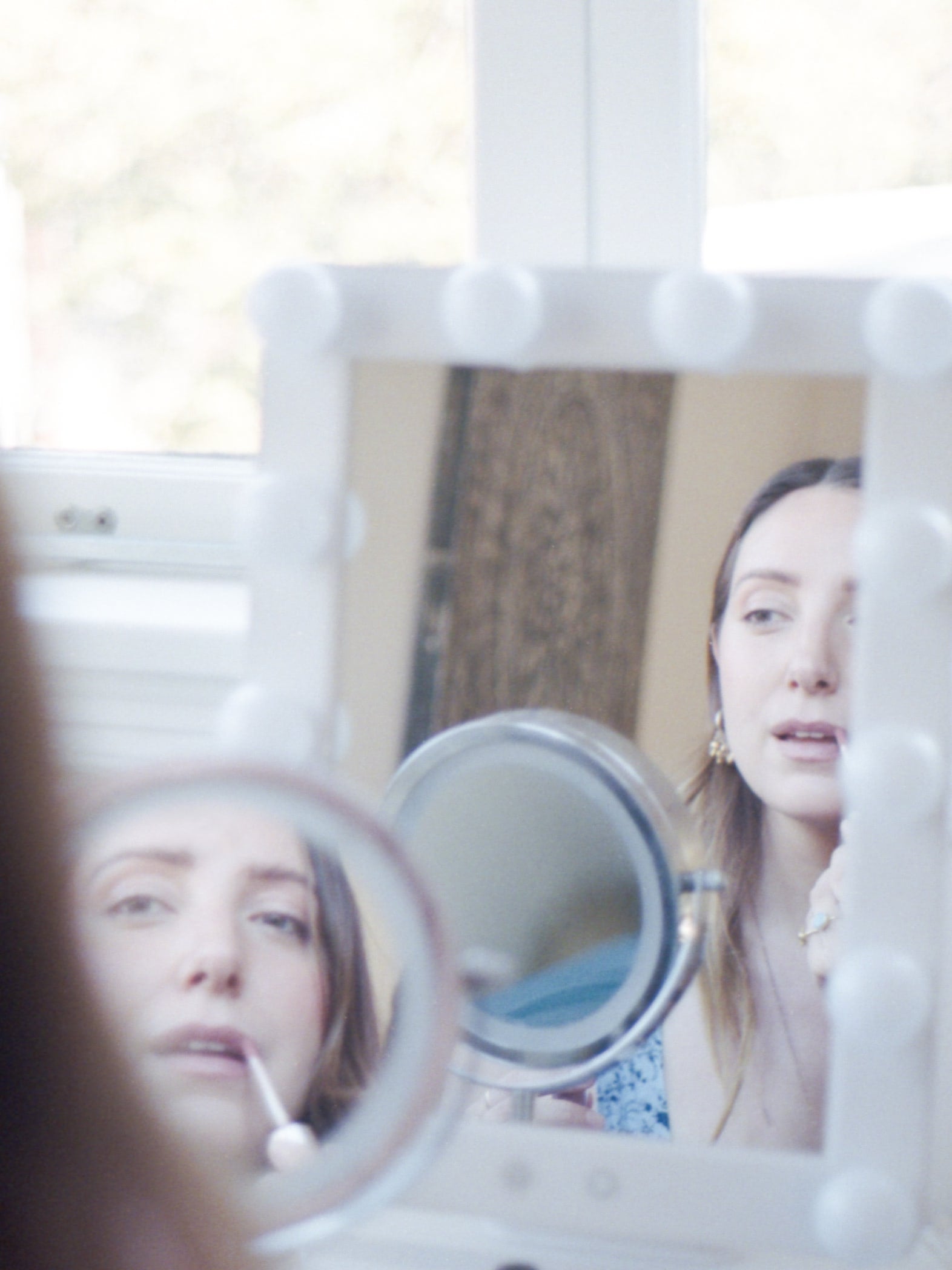Merrady Wickes


The makeup artist and beauty brand director who believes it feels like a miracle to be operating in a more present state.

The dogs, no matter what’s going on, have their needs and routines. They’re so snuggly and also, they’re terrible. They still have accidents and they’ll bark at things. But it gets you out of your headspace if you’re feeling selfish. When we foster, it’s nice to do something outside of ourselves. They’re unconditional love.

I’m not great at a daily meditation practice. I downloaded the Waking Up app almost a year ago and there’s a 30-day meditation course and I just did day 27. But I do a lot of activities that feel meditative. So whether it’s soaking in the bath, sitting outside, taking a long walk, or even doing my skincare routine. It’s less about focusing on, did I sit still and do a specific meditation for 10 minutes so much as I’m doing something that feels calming, a little pause, something just for myself.
What helps make you feel present?
I’m someone who for years tried to fix myself with everything else. I was raised somewhat religious and mental health was really stigmatized. So I felt like I wasn’t trying hard enough. I was taking meditation courses, trying to exercise, trying to eat well, and taking all the supplements. I could get one thing done a day, but then I would feel really exhausted, frustrated, or stressed.
I kind of operated at a low-level depression and high-level anxiety pretty much all the time. It took me a few tries, but I am on a really low-dose antidepressant and I feel like it equalizes me. I feel like myself again for the first time in a long time. I was raised that medication might make you numb or not yourself or robotic. And it’s the opposite. I can feel my full spectrum of feelings now. I feel more fully myself. It feels like a miracle to be operating in a more present state.

In the bath. I bring in a book and I read sometimes for 3 hours. I love to put in a beautiful bath milk, bath salts, or essential oils. I usually light a candle and I close the door and dim the lights. I feel like I’m floating. Like I’m in my own little bubble. When it’s cooler outside, it’s a daily ritual. Now that it’s a little warmer, it’s not as often, more like once a week.
How would you describe your mental health, currently?
I’m going through some personal health challenges that have been interesting for my mental health. But at the same time, because I’ve had years of therapy and I’m on a good amount of medication, I feel really equipped to cope with what’s happening. Whereas I think it would have really sent me into a spiral even 6 months or a year ago.
Boundaries, too are very important to me. Over the last decade, I’ve been dealing with health challenges where I have stage 4 endometriosis. I’ve had multiple surgeries and my last surgery, I lost an ovary. I’m in surgical menopause at 37, which is super wild because it never occurred to me that you could be under 40 dealing with those kinds of hormonal changes.
Through a lot of therapy, I’ve learned that the best thing for myself and the people around me is to tune in. I don’t have to be on every photo shoot. I don’t have to say yes to every project. And I don’t have to collaborate with everyone who asks.
How does intimacy and relationships impact your mental health?
I learned that I become an extrovert to people please, but that it was actually really exhausting and draining for me. So one of my biggest lessons has been to respect that I like a smaller intimate circle. One of my friends said yesterday, in spending time with your friends, it’s about quality time, not quantity time.
In my personal relationship, my husband Thom and I are learning to deal with our own mental health. He was diagnosed with ADHD and when I was reading up on it to try to be supportive, I was like, wait, this isn’t just you; this is everybody. That’s how I found out that I had ADHD and got tested. I’ve since learned that people with ADHD tend to attract each other because their brains work kind of similarly.
It’s that neurodivergency where we like that energy. With couples therapy, both of us learning more about medication, and learning more about what makes us tick and how our brains work, we’ve become, I think, a much stronger couple and much more intimate. Thom’s very affable, I’m high maintenance, but we can coast really well. We’ve been married 12 years where we were kind of living side by side, pretty comfortably. But in the last few years facing our mental health, suddenly it’s like we’re meeting brand new people and I can really enjoy his company. I think we’re getting to know each other all over again because we’re very different people than we were 12 years ago.

I am someone who tried all the supplements and it’s actually how I discovered I had endometriosis. Someone recommended I try Shatavari, an Ayurvedic herb that helps boost your estrogen. If you are already estrogen dominant, it’s not the best thing. So when I was taking Shatavari, I almost went to the hospital with pain because it kicked off my endometriosis symptoms that I wasn’t really aware of at the time. Because I have such a delicate hormonal balance, I have to be careful. People love to be like, you should just take this and this and this and this and this, but for me, I’m that person that I feel everything I’m taking. I have to really be mindful of, here’s what I’m taking and how does it feel in my body?
I do a low-dose antidepressant everyday and then I do a multivitamin that has a little bit of chaste berry in it, which is great for regulating hormones. It also has turmeric and a few other ingredients. But I can’t remember to take things. I have an app on my phone that dings me every day and keeps reminding me until I check off that I’ve taken my medication.
What makes you stressed or anxious and therefore impacts your mood and mental health?
I absorb the energy around me. I’m the youngest of seven kids and it was my survival to be hyper-aware of how everyone around me was feeling and doing. As an adult, always taking in everything and with the state of the world right now, it’s such a balance of what can I do to help. So that keeps me up at night. I can really spiral, so I try to be mindful of my media consumption. But then I start feeling as if I’m not looking at it at all. And that’s my privilege. I shouldn’t be able to just unplug from it, but I’m not helpful if I’m spiraling.
I’m also naturally a little bit messy and I’m really triggered if I can’t find something. If I’m making a recipe and I can’t find an ingredient, I can feel myself getting really anxious. That was actually an indicator that my medication was working. When I was making a recipe and I was missing something, I kept going. Six months ago, I couldn’t have done that. I would have had a little meltdown.
Also, getting the ADHD diagnosis helped me have a lot of compassion for myself. I’ve learned there are other things my brain is good at and that’s my superpower, I can do things that other people can’t do.